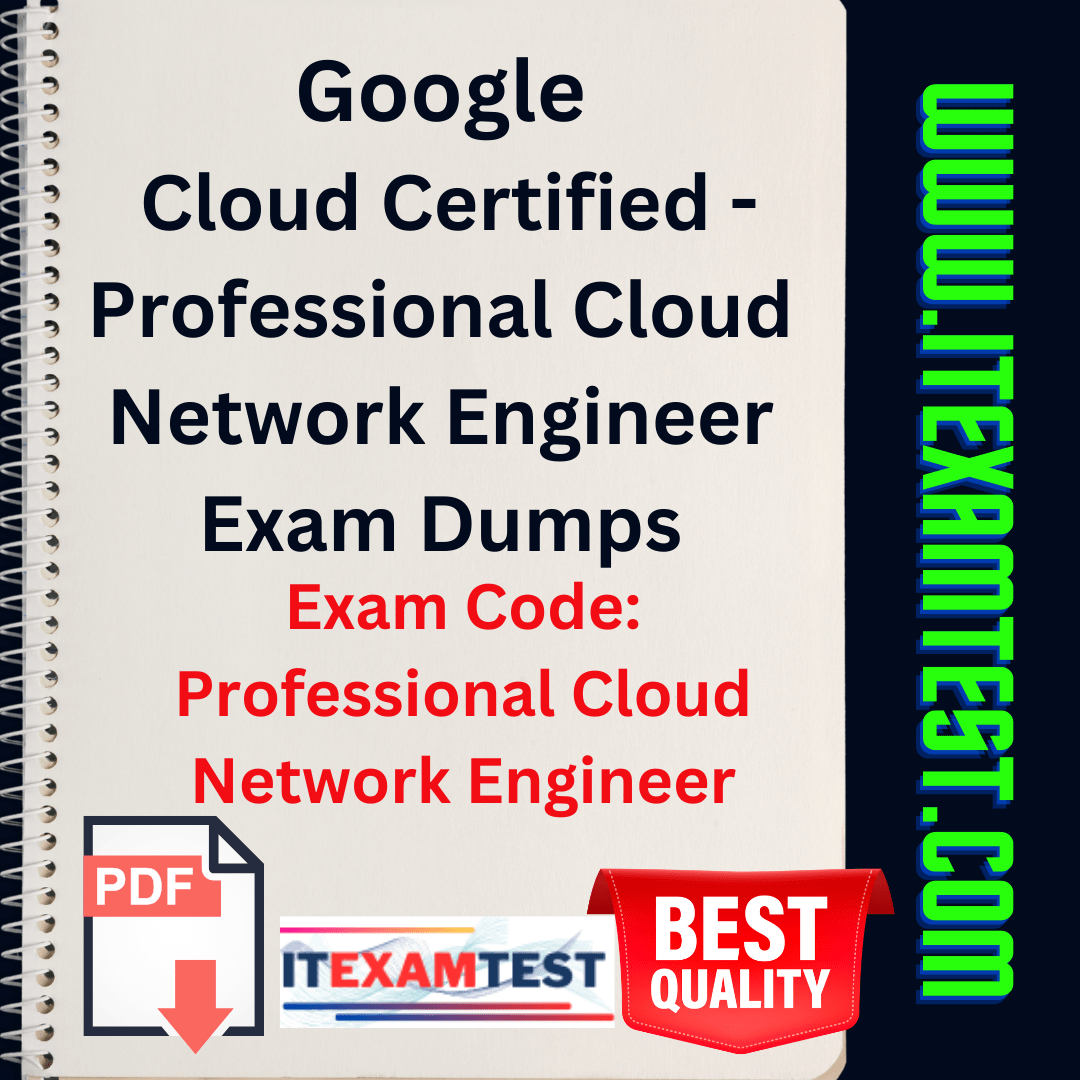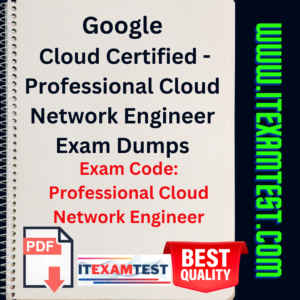Introduction to the Google Professional Cloud Network Engineer Exam
The Google Professional Cloud Network Engineer Exam is a pivotal certification for IT professionals specializing in cloud networking. This exam evaluates an individual’s ability to design, implement, and manage Google Cloud Platform (GCP) network architectures. It encompasses a range of topics including Virtual Private Cloud (VPC), hybrid connectivity, network security, logging and monitoring, and optimizing network performance. The certification is highly regarded in the IT industry, acknowledging the expertise required to proficiently handle complex network solutions on GCP.
Obtaining the Google Professional Cloud Network Engineer certification offers numerous benefits. Certified engineers are recognized for their advanced proficiency in managing Google Cloud networks, which can lead to increased job opportunities, higher salary prospects, and career advancement. Moreover, it serves as a testament to the individual’s commitment to staying updated with the latest technological advancements and best practices in cloud networking.
Before attempting the exam, there are certain prerequisites to consider. Candidates should have a strong background in network management and cloud computing, with practical experience in using Google Cloud Platform services. It is also beneficial to have a good understanding of general networking concepts and experience with on-premises and cloud-based network architectures. Familiarity with network security measures and protocols is also crucial.
This certification is ideal for network professionals, cloud engineers, and IT specialists who are responsible for managing network infrastructure on GCP. It is also suitable for those who aim to enhance their skills in cloud networking and aspire to take on more advanced roles in their careers. By mastering the competencies required for this certification, candidates can significantly contribute to their organizations’ cloud strategies, ensuring robust and efficient network solutions.
Understanding the Exam Structure and Format
The Google Professional Cloud Network Engineer exam is meticulously designed to evaluate the expertise of individuals in managing and implementing network architectures on Google Cloud Platform (GCP). Understanding the structure and format of this exam is crucial for effective preparation. The exam comprises multiple-choice and multiple-select questions, which aim to assess a candidate’s practical knowledge and problem-solving skills in real-world scenarios.
Candidates will face a total of 50 questions, all of which are to be completed within a 2-hour time frame. This duration demands not only a thorough understanding of Google Cloud’s networking capabilities but also the ability to manage time efficiently to ensure that all questions are addressed. The passing score for the exam is set at 70%, requiring a comprehensive grasp of the material to succeed.
Google Cloud provides specific guidelines that candidates must follow during the exam. These include adhering to the time limit, not using any external resources, and maintaining the integrity of the exam environment. The exam is administered in a proctored setting, either at a testing center or online, and candidates are expected to comply with all proctoring rules to ensure a fair assessment process.
Preparation for the exam should, therefore, include not only studying the relevant materials but also familiarizing oneself with the exam’s format and time constraints. Understanding the types of questions you will encounter can significantly impact your performance, as it allows you to strategize your approach to each section effectively. Being well-versed in Google Cloud’s network solutions, such as Virtual Private Cloud (VPC), hybrid connectivity, and network security, is essential for navigating through the questions efficiently.
In summary, mastering the Google Professional Cloud Network Engineer exam requires a balanced blend of theoretical knowledge and practical application. Knowing the exam structure and format will equip you with the necessary insights to tackle the exam confidently and enhance your chances of achieving certification.
Key Topics and Domains Covered
The Google Professional Cloud Network Engineer exam is designed to assess a candidate’s expertise in managing and implementing network architectures on Google Cloud Platform (GCP). The exam covers several critical domains, each with specific sub-topics and weightage. Understanding these domains is essential for a successful outcome.
Designing, Planning, and Prototyping a GCP Network: This domain focuses on the ability to design and plan network architecture that meets business requirements. Candidates should be proficient in creating network designs that incorporate scalability, high availability, and cost-efficiency. Key sub-topics include selecting appropriate network models, designing network architectures, and prototyping solutions to validate design choices. This domain typically holds significant weight in the exam, emphasizing its importance.
Implementing Virtual Private Clouds (VPCs): VPCs form the backbone of network architecture on GCP. Candidates must demonstrate their ability to create and manage VPCs, configure subnets, and implement firewall rules. Understanding VPC peering, shared VPC, and custom routes is crucial. This domain also covers best practices for networking within a VPC, including efficient IP addressing and traffic management. Mastery of VPC implementation is vital for ensuring secure and efficient network operations.
Hybrid Connectivity: This domain evaluates the candidate’s skills in establishing secure and reliable connections between on-premises environments and GCP. Key areas include configuring VPNs, Interconnect, and Direct Peering. Candidates should be familiar with scenarios requiring hybrid connectivity and the advantages and limitations of different connection methods. Proficiency in this domain ensures seamless integration of on-premises and cloud infrastructure.
Network Services: GCP offers a range of network services that candidates must be adept at using. This includes Cloud DNS, Cloud CDN, and Cloud Load Balancing. Understanding how to configure and manage these services is crucial for optimizing network performance and ensuring service reliability. Candidates should also be familiar with the use cases and configurations for each service.
Security: Security is a critical aspect of cloud networking. This domain covers best practices for securing network resources, including the configuration of IAM roles, firewall rules, and network policies. Candidates must understand encryption methods, DDoS protection, and network monitoring tools. A strong grasp of security principles ensures robust protection against potential threats and vulnerabilities.
Each of these domains requires thorough preparation and understanding. By focusing on these key areas, candidates can enhance their chances of success in the Google Professional Cloud Network Engineer exam.
Recommended Study Materials and Resources
Preparing for the Google Professional Cloud Network Engineer exam requires a strategic approach, utilizing a variety of study materials and resources to ensure comprehensive understanding and readiness. Key resources include official Google Cloud documentation, online courses, books, practice exams, and community forums. Each resource offers unique benefits and can be integrated into your study plan for optimal results.
Official Google Cloud Documentation
The official Google Cloud documentation is an essential resource, providing detailed information on Google Cloud’s networking services, architecture, and best practices. It is advisable to thoroughly review the documentation on topics such as Virtual Private Cloud (VPC) design, hybrid connectivity, network security, and troubleshooting. The documentation is regularly updated, ensuring that you are studying the most current information.
Online Courses
Several reputable online learning platforms offer courses specifically designed to prepare candidates for the Google Professional Cloud Network Engineer exam. Coursera, for example, provides a Google Cloud specialization that covers various aspects of cloud networking. Additionally, A Cloud Guru and Udemy offer comprehensive courses that include hands-on labs and practical exercises, which are crucial for gaining real-world experience.
Books
Books can provide in-depth knowledge and a structured approach to studying. “Google Cloud Certified Professional Cloud Network Engineer Study Guide” by Dan Sullivan is a highly recommended book that covers all exam objectives and includes practice questions and case studies. Books allow for offline study and can be a valuable reference tool throughout your preparation.
Practice Exams
Practice exams are indispensable for gauging your readiness and identifying areas that need further study. Websites like Whizlabs and ExamPro offer practice tests that simulate the actual exam environment. Regularly taking these exams can help build confidence and improve your time management skills.
Community Forums
Engaging with community forums such as Reddit, Stack Overflow, and Google Cloud Community can provide insights and tips from other candidates and certified professionals. These platforms offer a space to ask questions, share experiences, and stay updated on any changes or new developments related to the exam.
By combining these resources and dedicating consistent study time, candidates can effectively prepare for the Google Professional Cloud Network Engineer exam and increase their chances of success.
Building Hands-On Experience
Gaining hands-on experience is crucial for mastering the Google Professional Cloud Network Engineer Exam. Practical exposure to Google Cloud Platform (GCP) services not only reinforces theoretical knowledge but also enhances problem-solving skills essential for real-world applications. One effective way to start is by setting up a personal GCP project. This allows you to explore various network configurations and understand how different components interact within the ecosystem.
Begin by familiarizing yourself with the Google Cloud Console, an intuitive interface that enables you to manage resources and monitor network performance. Additionally, leveraging the command-line tools such as gcloud can provide deeper insights into the underlying processes and offer more granular control over configurations. Regularly switching between the console and command-line tools can help you become proficient in both environments.
Experimentation is key to building hands-on experience. Create and manage Virtual Private Clouds (VPCs), subnets, and firewall rules to understand their roles in network architecture. Deploying virtual machines and configuring them within different network topologies will help you grasp the nuances of network segmentation and isolation. Also, practice setting up VPNs and interconnecting networks to get a feel for hybrid and multi-cloud scenarios.
To simulate real-world scenarios, consider using Google Cloud’s lab exercises and sandbox environments. Platforms like Qwiklabs offer guided labs that walk you through various tasks, from basic network setups to complex configurations. These labs provide valuable insights into best practices and common pitfalls, ensuring you’re well-prepared for the exam and subsequent professional challenges.
Moreover, participating in community forums and study groups can be beneficial. Engaging with peers who are also preparing for the exam can provide new perspectives and solutions to common problems. Sharing experiences and troubleshooting collectively can deepen your understanding and help you stay updated with the latest developments in GCP networking.
Exam Preparation Strategies and Tips
Preparing for the Google Professional Cloud Network Engineer Exam requires a structured and strategic approach. Crafting a comprehensive study plan is essential. Start by familiarizing yourself with the exam guide provided by Google, which outlines the domains and competencies you need to master. Break down these domains into manageable sections and allocate specific timeframes for each, ensuring you cover all topics methodically.
Effective time management techniques can significantly enhance your study sessions. Utilize tools such as Pomodoro timers to maintain focus and productivity. Schedule regular breaks to prevent burnout and maintain mental clarity. It’s also beneficial to set aside dedicated study periods each day, gradually increasing the intensity as the exam date approaches.
Understanding and analyzing exam questions is a critical skill. Practice with sample questions and past papers to become familiar with the question formats and the complexity of the scenarios presented. Focus on interpreting the questions accurately and identifying key terms and concepts. This practice will help in developing the analytical skills required to tackle the exam effectively.
Handling exam stress is another crucial aspect of preparation. Incorporate stress-relief techniques such as meditation, exercise, or deep-breathing exercises into your daily routine. These practices can improve concentration and reduce anxiety. Additionally, ensure you get adequate rest, particularly in the days leading up to the exam, as a well-rested mind is more capable of processing and retaining information.
Learning from individuals who have successfully passed the exam can provide invaluable insights. Engage with online forums and study groups where past examinees share their experiences and strategies. Their first-hand accounts can offer practical tips and highlight common pitfalls to avoid. By following these strategic advice and preparation tips, you can approach the Google Professional Cloud Network Engineer Exam with confidence and a well-rounded understanding of the material.
What to Expect on Exam Day
The day of the Google Professional Cloud Network Engineer exam can be a significant milestone in your professional journey. Whether you opt to take the exam online or at a designated testing center, it is paramount to be well-prepared for the logistics involved.
If you are taking the exam at a testing center, ensure you arrive at least 30 minutes before your scheduled time. Bring a valid, government-issued photo identification document such as a passport or driver’s license. The testing center will have strict security protocols, including biometric verification and secure storage for personal items. If you are taking the exam online, ensure your testing environment is quiet, well-lit, and free from interruptions. You will need a computer with a reliable internet connection, a webcam, and a functioning microphone.
The check-in process is thorough and may include a series of steps to verify your identity and ensure the integrity of the exam. You will be required to show your ID, and if taking the exam online, you might need to provide a 360-degree view of your surroundings using your webcam. Once checked in, you will be guided to the exam interface.
The exam interface is designed to be user-friendly, featuring a clear layout with easy navigation between questions. You will have the ability to mark questions for review and return to them later. Familiarize yourself with the tools provided, such as the calculator and scratchpad, which can be invaluable during the exam. In case you encounter any technical issues, promptly inform the proctor or use the provided support channels to address the problem immediately.
Understanding the exam policies is crucial. These policies cover aspects such as time limits, breaks, and prohibited materials. Adhering to these guidelines will help ensure a smooth exam experience. By being well-prepared and knowing what to expect, you can focus on demonstrating your expertise as a Google Professional Cloud Network Engineer, rather than worrying about the logistics of the exam day.
Post-Exam Steps and Continuing Education
Upon completion of the Google Professional Cloud Network Engineer exam, the immediate next step is to access your exam results. Typically, Google Cloud provides the results within a few days through the email associated with your Google Cloud account. Successful candidates will receive a digital certificate and badge, which can be shared on professional networks such as LinkedIn. This certification is valid for two years, after which re-certification is necessary to maintain your credentials.
Securing your certification as a Google Professional Cloud Network Engineer is a significant achievement, but it is equally important to continue your education in the ever-evolving field of cloud networking. The rapid pace of technological advancements necessitates a commitment to lifelong learning. Google Cloud offers numerous resources to stay updated, including whitepapers, webinars, and online courses through Google Cloud Skills Boost, which covers advanced topics and new features.
Moreover, joining professional communities and forums can be incredibly beneficial. Platforms like the Google Cloud Community and Reddit’s r/googlecloud offer opportunities to interact with other professionals, share experiences, and discuss the latest trends and challenges in Google Cloud Networking. Additionally, attending industry conferences and workshops can provide valuable insights and networking opportunities.
For those looking to further advance their knowledge and credentials, consider pursuing advanced certifications. Google Cloud offers a range of certifications beyond the Professional Cloud Network Engineer, such as the Google Cloud Professional Cloud Architect and the Google Cloud Professional Data Engineer. Each of these certifications focuses on different aspects of cloud computing and can significantly enhance your expertise and career prospects.
In conclusion, while passing the Google Professional Cloud Network Engineer exam is a commendable milestone, it is just the beginning of your journey in cloud networking. Embrace continuous learning and professional development to stay ahead in this dynamic field.







deepak (verified owner) –
Super safe website
Roshani (verified owner) –
Explanations are really helpfu
Aloo (verified owner) –
The questions are valid in this exam dumps. I passed my exam yesterday. Now going to enjoy some cricket.
Nerd (verified owner) –
it is easier to pass your certification exam.
vinod (verified owner) –
great Question on the case studies .. Cheers .. keep it up by adding more .. Thanks
surender (verified owner) –
Good questions
jide (verified owner) –
It was a good one and the solution was great